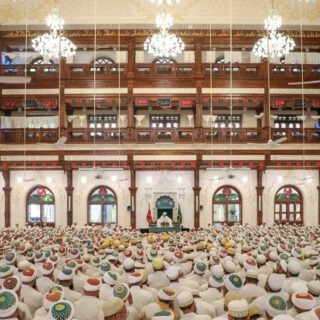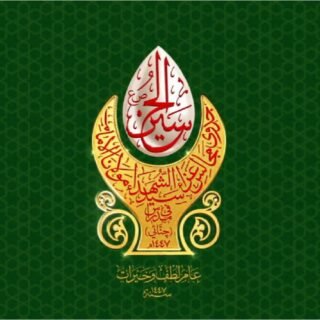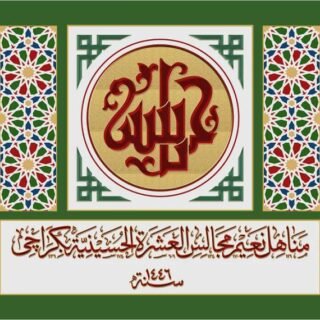Wʿaz mubarak commenced with the bayān mubārak of al-Dai al-Ajal Syedna Mohammed Burhanuddin RA from the ʿurs mubārak of al-Dai al-Ajal Syedna Taher Saifuddin RA in 1419 H.
It began with the zikr of Amirul Mumineen AS who is referred to in the Quran as Aliyun Hakeem (علي حكيم), two of the names of the Almighty. Ḥikma – wisdom – is that which supports divine revelation; that which goes to the heart of the meaning of the Quran is what is known as ḥikma. It is because of this that the act of a ḥakīm (sage) is never devoid of wisdom and meaning.
Amirul Mumineen AS appeared before Jabir in several forms, as Rasul Allah SAW, then as Maulatona Fatema AS, as Imam Hasan AS and as Imam Husain AS before returning to his own form again to demonstrate that in each age Awliya Allah AS can and do appear in whichever form they choose.
Al-Dai al-Ajal Syedna Taher Saifuddin RA recounted an event that transpired when Maulana Ali AS was accompanying Rasul Allah SAW. Maulana Ali AS beseeched Rasul Allah SAW to pray to Allah for his forgiveness. Rasul Allah SAW prayed namaz and held his hands up to the heavens, saying, ‘Oh Allah, by the grace of Ali, forgive Ali!’ Maulana Ali AS enquired as to why Rasul Allah SAW prayed in this manner. He explained that Ali AS deserved the best wasīla possible for his prayers, and there was no wasīla better than that of Maulana Ali AS.
Al-Dai al-Ajal Syedna Taher Saifuddin RA then shared a few verses he had written in praise of Maulana Ali’s AS character and its similarity with that of Rasul Allah’s SAW in each and every aspect. In one verse, he stated that the walāya of Maulana Ali AS is the most protective shield one can have from hellfire.
In his wʿaz mubarak delivered on the day of Maulatona Fatema al-Zahra’s AS shahāda this year, al-Dai al-Ajal Syedna Mufaddal Saifuddin TUS explained that Allah has placed each and every entity of creation in its rightful place. The placement of the Sun in the fourth orbit is one example. Were it placed any further away from Earth, then all that is on this planet would perish with cold, whereas if it were any closer the heat would be unbearable. The sun is placed just so as to enable life to thrive. This process is based on prior knowledge, not on trial and error as humans are wont to do.
Matters of fate and decree are very difficult to comprehend, Amirul Mumineen AS describes it as a secret which cannot be fathomed, a mountain that cannot be scaled and a sea that cannot be traversed. To explain the distinction between fate and decree, al-Dai al-Ajal Syedna Mufaddal Saifuddin TUS recounted an instance when Rasul Allah SAW was standing next to a wall which was very unstable and close to collapse. He moved away from it and was asked whether he was fearful of what the Almighty had ordained? He replied that he was turning from Allah’s decree towards fate, for if Allah had decreed for the wall to collapse, then it was up to the individual to move away and save himself. If he were not to do so and instead surrender himself to the falling wall, thus perishing, then that would be an act of suicide.
It is imperative that one readily accepts Allah’s decree and recognises that, even in matters that one finds difficult to accept, there is benefit in the long term. Allah has finalised the decree of four things with regards to man: his character, his form, his livelihood and his death. Now, for example, if one is destined to remain necessitous he should accept this fate and be content with whatever he has. In doing so he will actually lead the life of a man of means. On the other hand, if he resorts to haram he may succeed in increasing his income but will be deprived of peace of mind and ultimately his feeling of poverty will only worsen.
In times of difficulty one should only reach out to Allah and His Awliyāʾ, rather than to others. ِAmirul Mumineen AS states, ‘The one who complains of a need to a Mumin, it is as if he is complaining to Allah, whereas the one who complains to another is making a complaint against Allah’. In this context Syedna al-Dai al-Ajal TUS related the instance when Maulana Abizar RA came to Maulatena Fatema AS burdened with a debt of 400 dinars that he was unable to repay and which his creditors were demanding. Maulatena Fatema AS gestured toward a stone in her home, Maulana Abizar RA was puzzled as to what a mere stone would accomplish but Maulatena Fatema AS – knowing what was going through his mind – instructed him to take it and return whatever remained once his debt was paid. As he headed towards the market he saw that the stone had become pure gold. He broke off a small piece and with it he paid his creditors and then returned, replacing the gold – which had once again turned to stone – from where he had taken it. Maulatona Fatema AS stated, ‘what is there to be said of a stone of the house of the Ahlebayt! Do not dismiss it as a mere stone’.
Syedna al-Dai al-Ajal TUS mentioned that we are bound to receive whatever fate and destiny has in store for us, however, the mindframe and attitude with which we accept it depends on us. He then added that we also have the opportunity to shape our fate and destiny in subsequent eras. Syedi Abdeali Imaduddin QR states in his nasīḥat:
Whoever in the past rendered khidmat of Dawat with dedication and sincerity has been rewarded with riches and wealth in this existence.
Towards the end of the wʿaz mubārak we heard the events leading up to the wafāt of Syedna Taher Saifuddin RA. Maulana RA had travelled to Matheran and as was his custom in the evenings, Syedna Mohammed Burhanuddin RA and shahzadas would select a qasīda and recite it in his presence. On the eve of 19th Rajab al-Asab, Syedna Taher Saifuddin RA chose the qasīda himself and as it was being recited he asked for the following verse to be repeated:
فواتحنا خير الفواتح أصبحت * بهم وبهم ندعو لخير الخواتم
By the virtue of Aale Mohammed AS, our beginnings have been the best of beginnings and by them we pray for the best of endings.
Maulana Burhanuddin RA tearfully recalled that the significance of the repetition of this verse was not realized at that moment. As Syedna Taher Saifuddin RA went to retire for the night, he instructed for Nazr al-Maqām AS to be set aside. He gave this instruction and duly reached the presence of the Imam of the Age.
In the zikr of Karbala and Imam Husain AS we listened as Syedna Burhanuddin RA spoke of Maulana Aliakbar AS. He was offered refuge by the enemy as he had kinship with the caliph to which he responded: ‘You offer me refuge but not to Nabi Mohammed’s SAW grandson? Accursed is your refuge.’ As he fought valiantly he returned to make one final plea to Imam Husain AS to quench his thirst which was granted with the parched tongue of his revered father and the ring of prophecy he placed in his mouth. He was thus sated. Content with what had been decreed for him, he set out to face the enemy one final time.
May Allah Tʿāalā grant our beloved Maula a long life and good health until Qiyāma, to quench the thirst of all our souls with the sweet waters of the Duat Mutlaqin’s AS heavenly knowledge.
www.jameasaifiyah.edu








